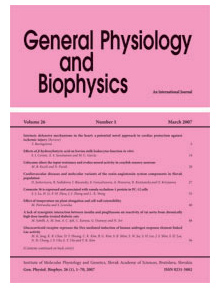Journal info
Aims and Scope |
||
Select Journal
Journals
Bratislava Medical Journal Endocrine Regulations General Physiology and Biophysics 2024 2023 2022 2021 2020 2019 2018 2017 2016 2015 2014 2013 2012 2011 2010 2009 2008 2007 Neoplasma Acta Virologica Studia Psychologica Cardiology Letters Psychológia a patopsych. dieťaťa Kovove Materialy-Metallic Materials Slovenská hudbaWebshop Cart
Your Cart is currently empty.
Info: Your browser does not accept cookies. To put products into your cart and purchase them you need to enable cookies.
General Physiology and Biophysics Vol.42, No.3, p 297–306, 2023 |
||
| Title: Chloroquine inhibits vasodilation induced by ATP-sensitive potassium channels in isolated rat aorta | ||
| Author: Kyeong-Eon Park, Soo Hee Lee, Sung Il Bae, Yeran Hwang, Seong-Ho Ok, Dawon Kang, Seung Hyun Ahn, Gyujin Sim, Jin Kyeong Park, Ju-Tae Sohn | ||
| Abstract: This study examined the effect of chloroquine on vasodilation induced by levcromakalim in isolated endothelium-denuded rat aortas and clarified the underlying mechanisms. We examined the effects of chloroquine, hydroxychloroquine, lipid emulsion, reactive oxygen species (ROS) scavenger N-acetyl-ʟ-cysteine (NAC), and KATP channel inhibitor glibenclamide on levcromakalim-induced vasodilation. The effects of chloroquine, hydroxychloroquine, NAC, and levcromakalim on membrane hyperpolarization and ROS production were examined in aortic vascular smooth muscle cells (VSMCs). Chloroquine inhibited levcromakalim-induced vasodilation more than hydroxychloroquine. NAC attenuated chloroquine-mediated inhibition of levcromakalim-induced vasodilation, while lipid emulsion had no effect. Glibenclamide eliminated levcromakalim-induced vasodilation in aortas pretreated with chloroquine. Chloroquine and hydroxychloroquine inhibited levcromakalim-induced membrane hyperpolarization in VSMCs. Chloroquine and hydroxychloroquine both produced ROS, but chloroquine produced more. NAC inhibited chloroquine-induced ROS production in VSMCs. Collectively, these results suggest that, partially through ROS production, chloroquine inhibits levcromakalim-induced vasodilation. In addition, chloroquine-induced KATP channel-induced vasodilation impairment was not restored by lipid emulsion. |
||
| Keywords: KATP channel — Levcromakalim — Vasodilation — Chloroquine — Reactive oxygen species | ||
| Published online: 02-May-2023 | ||
| Year: 2023, Volume: 42, Issue: 3 | Page From: 297, Page To: 306 | |
| doi:10.4149/gpb_2023008 |
||
|
|
 download file download file |
|

